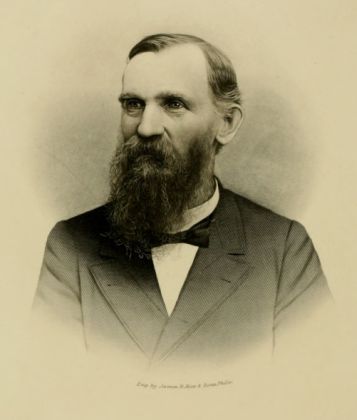|
Robert Raley

JUDGE ROBERT RALEY, whose sad and sudden taking away, in the fall of 1889, deprived the community of one of its most distinguished citizens, the legal profession one of its brightest lights, and the bench one of its purest and most able jurists, was born near Hanover, Columbiana Co., Ohio, October 23, 1837. His paternal grandparents were Robert Raley, born August 12, 1759, died October 14, 1849, and Sarah (Townsend) Raley, born January 24, 1764, died June 10, 1819; and his parents were John Raley, born November 27, 1790, died in May, 1868, and Melinda (Atkinson) Raley, born August 28, 1802, died April 3, 1845.
Like many of the successful men of our country, Judge Robert Raley was reared to agricultural pursuits, and for a number of years performed the usual duties of a farmer's son.
After leaving the farm he turned his attention to school teaching and surveying until losing, when he was twenty-one years old, his right arm by an accident in a threshing machine. He then turned his attention to the study of law, and in 1862 was admitted to the bar in Clinton County, Ohio. In 1863 he located in Carrollton and entered the law office of Judge John H. Tripp, as a law partner. At the October election
of the following year he was elected prosecuting attorney of Carroll County, as a candidate on the Republican ticket, which office he held continuously for ten years, being a close student all the while, many times burning the midnight oil over intricate points of law. He was methodical
in his work, careful in his pleadings, and logical in his presentation of a case to both court and jury. He jealously guarded "the peace and dignity of the State" and endeavored to "let no guilty man escape." In the cause of temperance he was zealous and untiring, and succeeded, while prosecuting attorney, in closing almost every saloon in the county. In April, 1S67, he became a member of the law firm of Shober & Raley, and continued to grow in popularity as an able advocate until he had one side of almost every important case before the court. Upon the resignation, in 1886, of Judge William R. Day, of Canton, Mr. Raley was appointed, by Governor Foraker, to fill the vacancy thus made in the common pleas bench of this district, and at the following election he was elected for five years. His kind deportment while judge called around him many warm friends from the bar of the district.
On November 12, 1867, Judge Raley was united in marriage with Miss Margaretta M. Sloan, of Hanoverton, Columbiana Co., Ohio. who was born May 19, 1840, a daughter of George and Jessie (Robertson) Sloan, former of whom, a native of Ireland, and by occupation a storekeeper and miller, came to America when a young man and settled in Ohio. He was born September 2, 1798, and died December 14, 1870. His wife was born April 24, 1802, and died February 12, 1884; she was a daughter of James and Janet (Stuart) Robertson, former of whom was born May 5, 1776, died at Hanover, Ohio, December 14, 1856, and latter was born August 12, 1774, died December 30, 1847. James Robertson was for many years a Presbyterian minister at the “Scotch Settlement,” near Wellsville, Ohio. After marriage Mr. and Mrs. Sloan settled in Hanover, Columbiana Co., Ohio, and became the parents of seven children — two sons and five daughters.
Immediately after their marriage Judge Raley and his wife moved to their home in Carrollton, where the widow yet resides. They had a family of six children, as follows: George Sloan, born September 7, 1868; John Frank, born February 9, 1870; Jessie Sloan, born January 18, 1872; Eliza Leigh, born February 20, 1875, died March 12. 1879; Robert James, born December 22, 1877, and Charles Milton, born May 31, 1883.
The domestic life of Judge Raley was an exceptionally happy one. Temperate in all things, the kindest of fathers and the most loving of husbands, he took the greatest pride in the care of his home and the comfort of his family. His reason could not be swayed by pathetic appeals, and while his mind often appeared to be shaped after the cold logic of the law, yet his private library shows frequent references to the poets, and his office table was often fragrant with rare flowers in their season. His friends and his family knew him as a loving, broad-minded man, whose clear, sound judgment quickly detected the shams and deceits of the world, and, while seeing them, yet exercised that patient, kindly forbearance and charity for the weaknesses of others that only a noble and generous man could have. He had that noble calmness of self-control, that determination to see and do the right, that ability to understand and pity the weak, not with a contemptuous indifference but with a helpful sympathy that made him a power in the city in which he lived. He died on Thursday evening, October 10, 1889, in the very prime of life. He fell from a tree while picking apples, and received internal injuries, from the effects of which he died at near 8 o'clock the same evening, lacking thirteen days of being fifty-two years of age. The news of the accident was a great shock to the community, as but a few hours before he had been mingling with his friends in his usual health and spirits. To his wife and children (for he left a daughter and four sons) the blow was simply overwhelming. The funeral was the most largely attended of any in Carrollton since the war. From the church the funeral train moved to the cemetery, and the remains of the distinguished townsman were laid to rest with a prayer and benediction.
Judge Raley was a man who had won for himself a high position in his profession, and a reputation for integrity and ability of which any man might be proud. Commencing life with none of the advantages of wealth, and without the help of influential friends, he, by his personal force, pushed forward until he had placed himself side by side with those who occupied the front rank of his chosen profession. In seeking after the secret of his success, it is found in the following particulars: a determination to succeed, a jealous regard for his personal honor, and a recognition of those moral and religious principles that must influence every life that would become truly great. As a lawyer, he was known throughout Eastern Ohio as an advocate who never lost a case which consummate skill and a thorough knowledge of the law could win. As a jurist he was noted for the carefulness with which he prepared even the most minor points, and for his broad understanding of the law. As a citizen and neighbor he was profoundly respected by all and tenderly loved by many, to whom in the greatness of his heart he had extended substantial sympathy. In his religious predilections Judge Raley was formerly a member of the Society of Friends, but during the last two years of his life he was a member of the Presbyterian Church.
Source: Commemorative Biographical Record of the counties of Harrison and Carroll, Ohio, containing Biographical Sketches of Prominent and Representative Citizens, and of Many of the Early Settled Families, Chicago, J. H. Beers & Co., 1891




 |
Welcome to The American History and Genealogy Project
(AHGP), an unincorporated
not-for-profit network of independent sites devoted to History & Genealogy,
and covering North American Countries and Territories. For more information
about our group, including how you can join us, please see our
About page. |
This page was last updated Tuesday, 28-Feb-2017 19:49:03 EST.
Webspace for this site is generously provided by
 and and 
This page is a free service to all Family Historians who are currently doing research in the Carroll County, Ohio area. It is not intended for commercial use.
This site may be freely linked, but not duplicated in any way without consent of the contributor.
All rights reserved! Commercial use of material within this site is prohibited!
 Copyright © 2017~2024 by Carroll County AHGP
Copyright © 2017~2024 by Carroll County AHGP
|
|
|

